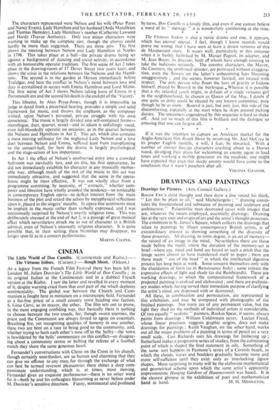CINEMA
The Little World of Don Camillo. (Continentale and Rialto.) The Virtuous Isidore. (Curzon.)—Rough Shoot. (Odeon.) As a legacy from the French Film Festival there has been left to London M. Julien Duvivier's The Little World of Don 'Camillo ; in its original Italian at the Continentale and in a dubbed French version at the Rialto. I saw the latter and revelled in every moment of it, despite warning cried from that cool part of me which deplores sentimentality. The global war between the Church and Com- munism is fought here in miniature on a microscopic field, Fernandel as a fist-free priest of a small country town heading one faction, S. Gino Cervi, as its mayor, the other. The film sets out to prove, in the most engaging confiding way, that basically there is nothing to choose between the two creeds, for, though sworn enemies, the priest and the Communist are always forced to agree on essentials. Breathing fire, yet recognising qualities of honesty in one another, these two are bent on a race to bring good to the community, and, whether trying to bash each other's nose off in the belfry—the town is bewildered by the bells' commentary on this conflict—or disagree- ing about a community centre or bribing the referee of a football match they share the same generous heart.
Fernandel 's conversations with Christ on the Cross in his church, though certainly unolthodox, are so human and charming that they can give no offence to any man, for through the exchange of what can best be termed reverent pleasantries there shines a deep com- passionate understanding, which is, at times, most moving. Fernandel gives an exquisite performance—there is no other word for it—both he and his colleagues blossoming as never before under M. Duvivier's sensitive direction. Funny, sentimental and profound by turns, Don Camillo is a lovely film, and even if one cannot believe a word of its " message " it is wonderfully comforting at the nine. • The Virtuous Isidore is also a rustic drama and one, it appears, which has eternal appeal. I feel, though I know records would prove me wrong, that I have seen at least a dozen versions of this de Maupassant story. It wears well, particularly in this instance when it is freshly furbished by M. Marcel Pagnol, its adapter, and M. lean Boyer, its director, both of whom have enough cunning to take the ludicrous seriously. The country characters, the Mayor, the Countess, the confirmed spinster, are portrayed without exaggera- tion, even the flowers on the latter's unbecoming hats blooming unaggressively ; and the scenes, however farcical, are treated with respect. The only person who flouts the laws of gravity is- Isidore himself, played by Bourvil in the burlesque.. Whereas it is possible that a shy retarded youth might, in default of a single virtuous girl in the neighbourhood, be chosen as Queen of the May, I doubt if one quite so dotty could be elected by any known committee, pure though he be as snow. Bourvil is just, but only just, this side of the discomforting, especially at the start when he skips around picking daisies. The uneasiness engendered by this sequence is hard to shake off. And yet so much of this film is brilliant and the dialogue so amusing that one can forgive all.
• • • If it was the intention to capture an Am$rican market for the Anglo-American film Rough Shoot by involving Mr. Joel McCrea in its proper English muddle, it will, I fear, be thwarted. With a number of sinister foreign characters crashing about in a Dorset wood, divulging their plans for welcoming an enemy agent in loud tones and working a mobile generator on the roadside, one might have expected that even this sleepy county would have come to the conclusion that it wasn't poachers after all.
VIRGINIA GRAHAM.


































 Previous page
Previous page